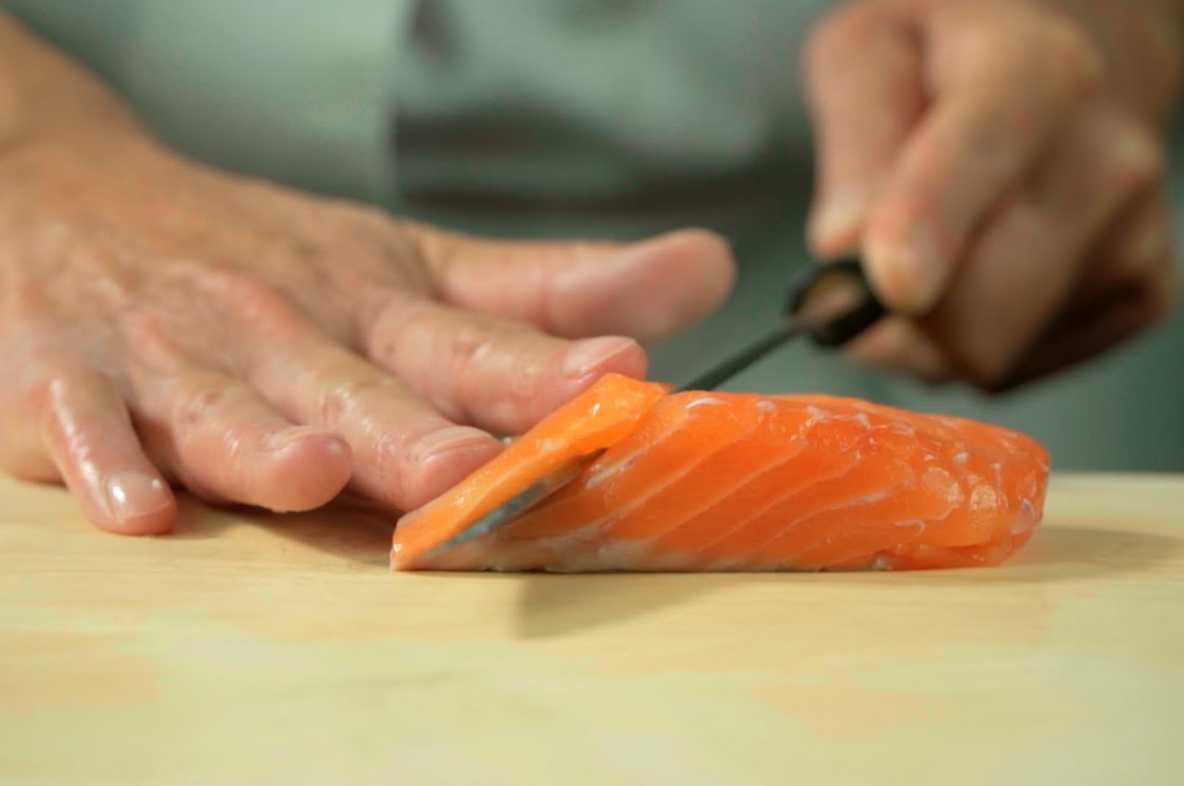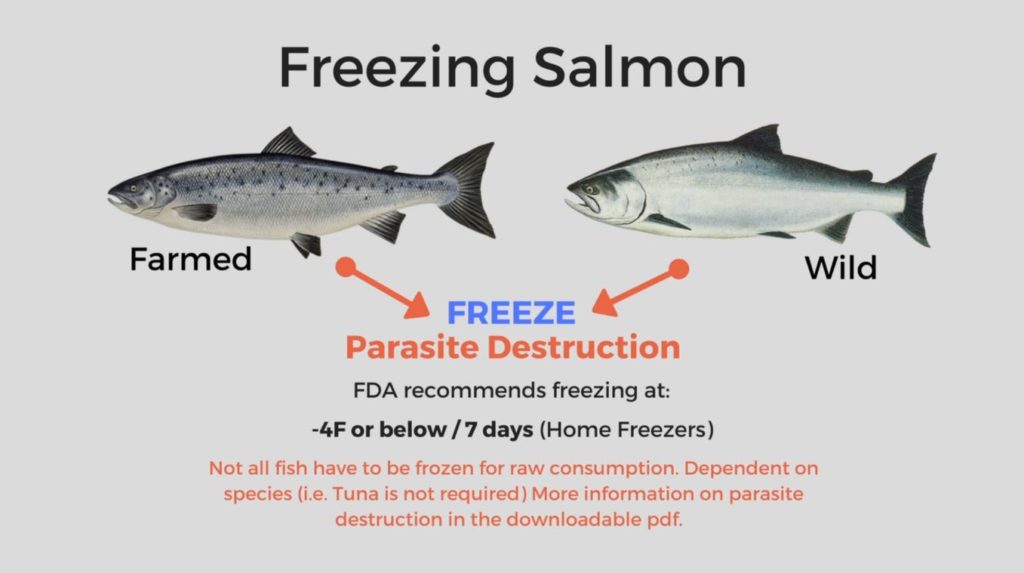I often get asked “Is freezing salmon for sushi necessary?” The short answer is yes. But the really answer is “maybe. ” The truth is, this is a loaded question depending on who you ask. Different stakeholders will give you contradicting answers. But the common answer is, yes. It’s not only safer, but economical for restaurants (more on this later).
I’ve worked in the sushi business for 10 years and have never seen a worm in a farm-raised salmon. I’ve filleted thousands of pounds of salmon from different countries and not once was parasite ever an issue. For the most part, salmon farms do their best to produce parasite free products. Norway, on the other hand, has stayed on the cutting edge of this issue, and research has helped them persuade many importers that their farmed salmon is free of parasites.
In general, you’ll need to figure out a lot of things to see if you need to freeze any kind of fish to eat raw. For example, is it a freshwater or saltwater fish? If saltwater, is the species known to carry parasites? Is it farmed? If so, was it raised in an open-net, pond, or recirculating closed loop system? Does it eat processed pellets or wild-caught food that hasn’t been treated?
Eating raw fish in dishes like sushi and sashimi has become increasingly popular around the world However, consuming raw seafood does come with some risks One of the main concerns is parasites that can infect certain fish species. Freezing salmon destined for raw preparations is an effective way to kill any parasites and make the fish safe to eat. This article will examine how long you need to freeze salmon to ensure it is safe for use in sushi.
Why Freeze Salmon for Sushi
Freezing fish that will be eaten raw does an important job: it kills parasites. Certain saltwater fish like salmon can harbor parasitic worms. The two main types of concern are:
-
Anisakis – These nematode roundworms can infect various fish and squid species. They can cause a condition called anisakiasis when ingested by humans. This may lead to symptoms like nausea, vomiting, and stomach pain.
-
Tapeworms: Some species of tapeworm larvae can also infect fish that live in salt water. If you eat raw fish or squid that has tapeworm larvae in it, you can get diphyllobothriasis.
Freshwater fish likewise may contain parasites, including different tapeworm species. Freezing effectively kills any parasite larvae and eggs in fish, making it safe for preparations like sushi, sashimi, poke bowls, and ceviche. This prevents transmission to humans when the fish is consumed raw.
Recommended Freezing Times for Salmon
Government agencies and food safety experts recommend particular freezing times and temperatures to ensure parasites in fish are killed before preparing sushi or other raw dishes. Here are the general guidelines:
-
Freeze at -4°F (-20°C) or below for 7 days – This is the minimum recommended freezing protocol, 7 days at -4°F/-20°C or colder will kill parasites
-
Freeze at -31°F (-35°C) or below for 15 hours – Freezing for 15 hours at ultra-low temperatures is also sufficient to kill parasites.
-
Store frozen fish at -4°F (-20°C) or below – After initially freezing frozen fish should be kept at -4°F or colder until ready to thaw and use.
-
Use fish within 3 to 6 months – For best quality, sushi-grade frozen fish should be used within 3 months. Fish is still safe up to 6 months frozen but quality may start declining.
Why Such Long Freezing Times are Needed
You may wonder why salmon and other sushi fish need to be frozen for so long – 1 week or more at subzero temperatures. Here are some reasons the freezing times are set as such:
-
Reach deep into thick fish fillets – Freezing needs to occur all the way through large cuts of fish to kill parasites residing deep in the flesh. A week or more is needed to thoroughly penetrate fillets.
-
Kill all parasite life stages – Different parasites have various life stages with differing levels of resistance to freezing. Long freeze times ensures all eggs, larvae, and adults are destroyed.
-
Provide a safety margin – The extended freezing times provides a margin of safety to kill all parasites in different fish species and sizes. It accounts for any variations.
So in short, the long freezing durations make sure parasites in every life stage are completely killed, even in the thickest fish cuts. This provides full protection against transmission when the salmon or other fish is consumed raw.
Does Freezing Affect Quality?
An important concern when freezing fish for long periods is whether it affects quality. Does the texture and flavor suffer after freezing salmon for a week or more?
Fortunately, freezing has minimal impacts on salmon quality when done properly. Here are some tips for preserving quality:
-
Use very fresh, sushi-grade salmon – Start with the highest quality fish possible.
-
Freeze fish rapidly – Fast freezing prevents large ice crystals from forming and damaging tissue.
-
Protect frozen fish – Use freezer bags, vacuum sealing, or freezer paper to prevent freezer burn.
-
Don’t thaw until ready to use – Thawing then re-freezing causes more quality loss.
-
Use within 3 months – For best texture and flavor, sushi fish is best within 3 months frozen.
Following these guidelines, frozen salmon retains excellent quality and is hard to discern from fresh never-frozen fish. Freezing locks in freshness and prevents deterioration.
Freezing Salmon at Home
You may be wondering if its possible to freeze salmon at home to make sushi. The answer is absolutely yes. Follow these tips for freezing salmon at home for sushi:
-
Get sushi-grade salmon – Purchase the highest quality, ultra-fresh fish from a trusted source.
-
Cut into 4 to 6 oz portions – Cut the salmon into manageable sized fillets before freezing.
-
Freeze rapidly – Use the coldest freezer setting and freeze fish quickly.
-
Protect the fish – Wrap fish well in freezer bags, freezer paper, or vacuum pack.
-
Label & date packages – Mark each package with name of fish and date frozen.
-
Freeze for 7+ days – Keep salmon frozen for at least 7 days before thawing for use.
Follow safe handling practices and these freezing guidelines for delicious sushi using salmon frozen at home.
Commercially Frozen Salmon
For convenience, you can also purchase commercially frozen salmon to use for sushi. Look for fish frozen quickly and properly under controlled conditions. Here are some tips for buying commercially frozen salmon:
-
Reputable seller – Purchase fish from a trusted, high-quality seafood purveyor.
-
Proper freezing – Ensure the salmon was blast frozen to subzero temperatures.
-
Date frozen – Look for packaging with clear label showing date frozen.
-
Vacuum sealed – Vacuum packaging helps prevent freezer burn during storage.
-
Use within 3-6 months – For best results, use frozen salmon within 3 to 6 months.
With proper freezing methods, commercially frozen salmon retains its freshness over extended storage. Use within a reasonable time for optimal flavor, texture, and safety.
Thawing Frozen Salmon
Once frozen, salmon needs to be thawed slowly and properly to preserve quality. Here are some guidelines for thawing frozen salmon:
-
Place fish in refrigerator – Thaw in the refrigerator overnight or up to 2 days.
-
Submerge in cold water – You can also submerge vacuum sealed frozen fish in cold water.
-
Don’t thaw at room temp – Avoid thawing at room temperature as bacteria can start growing.
-
Cook immediately – Cook fish immediately after thawing if not using for sushi or sashimi.
-
Rinse before use – Rinse thawed salmon under cold water and pat dry before slicing for sushi.
Proper thawing methods keep frozen salmon safe and retain the highest quality for use in sushi, sashimi, poke bowls, and other raw preparations.
Frequently Asked Questions
Here are answers to some common questions about freezing salmon for sushi:
-
How long does frozen salmon last? Properly frozen salmon keeps 3 to 6 months before deteriorating. Use within 3 months for highest quality.
-
Does freezing kill bacteria too? No, only heat kills bacteria. Freezing only kills parasites. Proper handling is still important.
-
Can I freeze salmon after catching it? Yes but it must be frozen quickly, not over a period of days.
-
Is previously frozen salmon safe to eat raw? Yes, if properly frozen according to the guidelines outlined above.
-
Can I refreeze salmon after thawing? No, only freeze fish once for quality and food safety.
Key Takeaways
To wrap up, here are the key takeaways on freezing salmon for sushi:
-
Freezing kills any parasites that may infect salmon and other saltwater fish. This makes raw consumption safer.
-
Fish should be frozen at -4°F/-20°C for 7 days or -31°F/-35°C for 15 hours minimum to kill parasites.
-
Proper freezing and storage preserves the quality and freshness of the salmon.
-
Salmon can be successfully frozen at home by individuals for use in sushi.
-
Commercially frozen salmon is fine too as long it was properly frozen and stored.
-
Always thaw frozen salmon slowly in the refrigerator for best quality and food safety.
Following these freezing guidelines, you can safely use delicious frozen salmon in sushi, sashimi, poke bowls and other popular raw fish preparations. Take the necessary precautions when consuming raw seafood to protect your health.

Should I freeze salmon I purchased from the store?
For sushi, yes. You don’t know if the farm salmon you purchased was raised in an parasite-free environment or not. Did the fish eat wild-caught food that might have parasites that could infect the stock? To be safe, freeze it.
I recommend buying whole salmons and fillet it yourself at home before freezing it for sushi. This way you’ll have control over the cutting surface used without worrying about cross-contamination.
(FYI, freezing doesn’t destroy bacteria, only heat will. This is why I never buy sushi fillets that have already been cut (unless they’ve been handled in a way that makes them safe to eat raw).

Most Comprehensive Sushi Course Online
There are so many factors to consider and there are loads of studies supporting different stakeholders, whether they’re food regulators or multi-million dollar aquaculture operations trying to convince authorities that their salmon is parasite free. (Norway Seafood Council tell Hong Kong their farmed salmon is parasite free)
The topic is on-going and beyond the scope of this article. For you guys at home, it doesn’t need to be complicated. Use the following questions below to help you:
